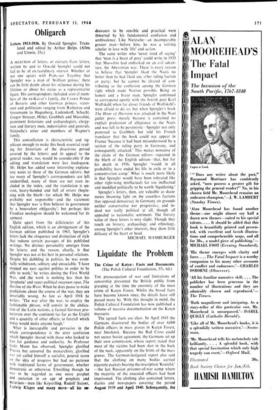Obligarch
A SELECTION of letters, or extracts from letters, written by and to Oswald Spengler could not fail to be of extraordinary interest. Whether or not one agrees with Protc,sor Toynbee that Spengler was a man of 'brilliant genius,' there can be little doubt about his inauence during his lifetime or about his status as a representative figure. His correspondents included several mem- bers of the ex-Kaiser's family, the Crown Prince of Bavaria and other German princes, states- men and politicians ranging from Rathenau and Stresemann to Hugenberg, Ludendorff, Schacht, Gregor Strasser, Hitler, Goebbels and Mussolini, prominent historians and archaeologists, clergy- men and literary men, industrialists and generals, Nietzsche's sister and members of Wagner's family.
This constellation is characteristic and sig- nificant enough to make this book essential read- ing for historians of the disastrous period covered by the letters; and its appeal to the general reader, too, would be considerable if the editing and translation were less inadequate. Mr, Helps has added some interesting explana- tory notes to those of the German editors; but too many of Spengler's correspondents are left unidentified, many of them are not even in- cluded in the index, and the translation is un- even, heavy-handed and full of errors (begin- ning with the blurb—for which Mr. Helps was probably not responsible—and the statement that. Spengler was 'a firm believer in government by a benevolent obligarchy'; but perhaps this Freudian neologism should be welcomed for its aptness).
Quite apart from the deficiencies of this English edition, which is an abridgement of the German edition published in 1963, Spengler's letters lack the eloquence and distinction of style that redeem certain passages of his published writings. No distinct personality emerges from the letters; and the reason, clearly, is that Spengler was not at his best in personal relations. Despite his dabbling in politics, he was essen- tially withdrawn, solitary and unsociable. 'I have stopped my ears, against politics in order to be able to work,' he writes during the First World War, and .the work is nothing less than his 'prophetic' and super-political magnum opus, The Decline of the West. When he does pause to make predictions about the course of the war, they are invariably wrong. As late as April 1918 he writes: `The war after the war, to employ the fashionable phrase, will consist in the abdica- tion of the Latin nations, a factual German pro- tectorate over the continent (as far as the Urals) and a quantity of other effects, to foretell which today would make anyone laugh.'
What is inescapable and pervasive in the whole correspondence is the utter confusion which Spengler shared with those who looked to him for guidance and authority. As Professor Golo Mann has observed, Spengler glorified Prussia but censured the monarchists, glorified War yet called himself a socialist, poured scorn on the idea of progress but had no patience with traditional forms of government, whether democratic or otherwise. Unwilling though he Was to be regarded as one more prophet and sectarian in an age of prophets and sectarians—men like Keyserling, Rudolf Steiner, Ludwig Klages and many more—all his es-
deavours to be sensible and practical were thwarted by his fundamental confusion and ambivalence. Like Nietzsche—an incomparably greater man—before him, he was a retiring scholar in love with 'life' and action.
The same writer who 'never tired of saying' that 'man is a beast of prey' could write in 1935 that Mussolini had embarked on an evil adven- ture, the Abyssinian war. There is every reason to believe that Spengler liked the Nazis no better than he had liked any other ruling faction or party; but he cannot be cleared of con- tributing to the confusion among the German right which made Nazism possible. Being an honest and a brave man, Spengler continued to correspond openly with the Jewish poet Karl Wolfskehl when far closer friends of Wolfskehl's were afraid to do so; but when Spengler's book The Hour of Decision was attacked in the Nazi gutter press—merely because it contained no explicit profession of allegiance to the Nazis and was felt to be pessimistic—Spengler not only protested to Goebbels but told his French translator that the book could not appear in France 'because it had been misunderstood by a section of the ruling party in Germany, and consequently attacked.' This makes nonsense of the - claim of the German editors—repeated in the blurb of the English edition—that, but for his death in 1936, Spengler 'would in all probability have ended his life in exile or in a concentration camp.' What is much more likely is that Spengler would have been tolerated like other right-wing intellectuals far too ineffectual and muddled politically to be worth 'liquidating.'
Spengler's letters, then, are valuable as docu- ments throwing light on the countless factions that opposed democracy in Germany on grounds neither conservative nor progressive, and in- deed not really political at all, though all appealed to nationalist sentiment. The literary value of these letters is very slight. Though they touch on history, archaeology and ethnology, among Spengler's other interests, they show little delicacy of the heart or head.
MICHAEL HAM BURGER


































 Previous page
Previous page